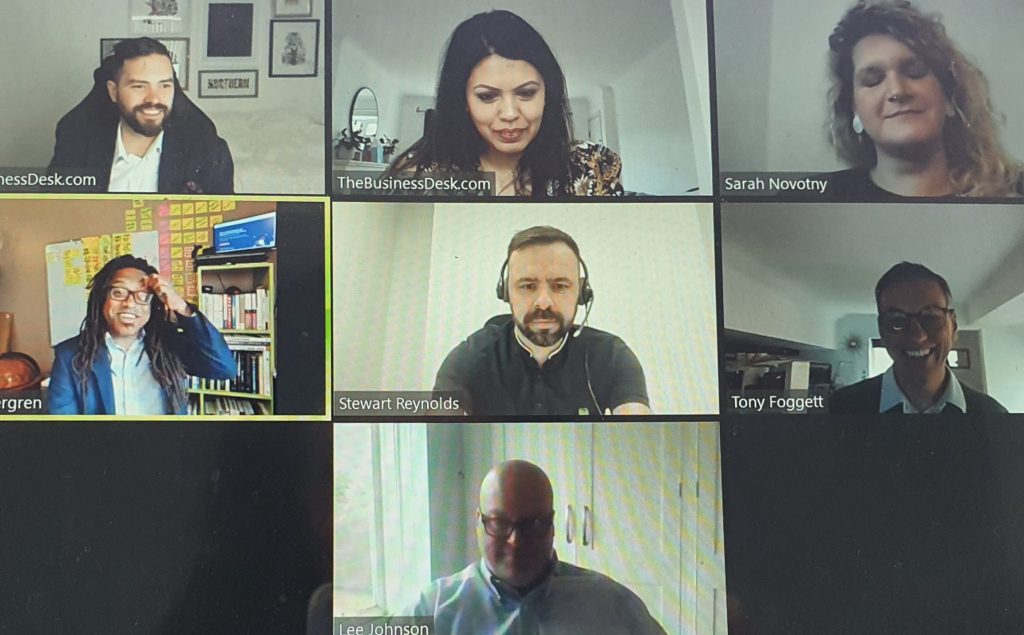Why effective leaders need to think about culture

The last 12 months has seen effective leadership come to play as businesses steered their firms through three lockdowns and now into the road to recovery.
The pandemic has shown the enormous responsibility leaders have had not only keeping themselves, and their teams, safe, but also motivated as well.
To explore what it takes a to be an effective leader, a panel of experts came together in an online event in partnership with The Growth Company to look at how leaders can re-energise their team and bring change into their organisations.
Panellists included;
- Dan Sodergren, co-founder and CIO of YourFlock and MPA’s diversity and inclusion lead
- Sarah Novotny, digital, creative and tech sector lead, GC Business Growth Hub
- Lee Johnson, co-founder and director of Laws of Attraction
- Tony Foggett, CEO & owner of Code Computerlove
- Stewart Reynolds, CCO & co-founder at Shopblocks
One of the key themes that leaders have had to focus on has been the challenge of retaining and implementing culture and the importance of that for both leaders, their organisation and their people.
Sarah Novotny, digital, creative and tech sector lead, GC Business Growth Hub, said: “We’ve found that because of the pandemic, hierarchies are flatter because it’s become easier to interact with people through digital mediums. So, while we have been missing the ‘water cooler chats,’ more people are talking to each other and rightfully so.
“But what that has meant for us is that we weren’t just focusing on the leader or the founder of the business but we’re inviting the leaders to bring more of their team to the support that we’re giving, and that’s been a real step change.”
She added that those open and more connected conversation will also help towards embedding culture too.
“No everyone’s culture has translated immediately,” Novotny pointed out.
“I would say that that was probably one of the most overlooked and slowest elements of change that’s been happening because everyone was so busy with stabilising and pivoting and innovating.
“And then suddenly, no one knew what to do, they weren’t going for drinks anymore, there were no meet-ups in the breakout rooms.
“So, when it came to onboarding new people, they weren’t integrated immediately into the culture that was there pre-pandemic, and it’s been difficult.
“It’s been important to look at all those elements and look at what we can learn from each other, how people have done it and that’s a really important part of the programmes that we run.”

Tony Foggett
For Tony Foggett, CEO & owner of Code Computerlove, is also working with The Growth Company’s Exceed programme which has focused on culture too.
“My definition of culture is how everybody behaves when there’s no leadership in the room,” he said.
“It’s about coming back to basics. If you want a healthy and strong culture in your business, then the starting point as a leader is to create the clarity around exactly what things you value in your organization and to make sure that you have delivered on all the things.
“Beyond that you need to make sure that you’ve translated that clarity into the fabric of the business.”

Dan Sodergren, YourFlock
Dan Sodergren is co-founder and CIO of YourFlock, a digital coaching platform that helps remote working teams discover and strengthen their core values.
For Sodergren, YourFlock has seen a demand following the acceleration of working from home.
He said: “YourFlock is helping to find out from leaders the core value of their company, finding out what attributes their company stands for the most and how much their teams are aligned with that central principle.
“Technology is a great way to solve some of these problems, but it’s going to have to be people led too. It is all very well using things like YourFlock or Peakon, but leaders must think about their resources and how they manage those resources differently.
“We talk about time on Zoom and different technologies, but we have to have people…so my question to everyone out there really is, how much are you invested in the head of people, or your head of culture, or your head of happiness for your organisation?
“In the future, they’re actually going to be key.”
Stewart Reynolds, CCO & co-founder at Shopblocks, a Stockport-based hosted ecommerce platform, has seen ‘exponential growth’ with plans to double this year as it helps businesses pivot to digital through the pandemic.
“When we went into the pandemic we had 18 stuff, we’ve now got 40 plus on the and we’ve nearly tripled in size in the last 12 months,” he said.
“Because we are quite a youthful firm and in that tech start-up journey, we typically employ people who are 16 to 25 years old. For some it’s their first job out of college or university. We seemed to have been good at attracting that young talent. A large part of that requires a huge amount of interaction especially when it comes to onboarding and training people through lockdown.
“There are eight core values that we work to and right from the start of the recruitment process through to people joining and their induction, we’re talking about those cultural fits. We focus just as much on culture as we do about the actual tactical day to day work that people are doing.”
Reynolds said half the team are now back in the office and that has made a positive difference already.
“It has been a challenge, but we moved people back into the office about a month ago and we’ve seen a big difference. The nature of the work we do means that being together has ramped up productivity.
“Not all young people want to work from home. When they are in a creative space they can work better, they’re not on their own and it’s been good for their mental health. We believe it will damage a whole generation of new, career minded, career driven digital talent if they can’t get in and learn quickly and get that mentorship from the leadership within our office or within our culture, so we’ll all be back in the office as soon as it’s safe to do so.”
Lee Johnson is co-founder and director of Laws of Attraction, a management consultancy business that specialises in organisational change.
He said Covid is helping leaders to drive change.
“As humans, we’re fairly social, we crave that social interaction, but the pandemic has had a massive disruption to businesses, to supply chains, to the markets, the people reduction, furloughs, interest rates, there’s a lot of stuff we’ve gone through but there are tools in the box to help leaders manage that change.”

Future is hybrid
Johnson believes the future of the workplace will become hybrid depending on the culture of the company.
“If you’ve got a group of millennials working in a creative company, they will want to be together.
“Those in multinational matrix organisations might be happy to work from home because they see their kids more or don’t want to travel as much.
“For many businesses it’s taken this pandemic to cause change and make us realise that we can actually work remotely when some of the company’s leadership cultures were actually pushing back on that before the crisis because they’ve always worked in an office and expected everyone else to do the same.
“The speed of change and reaction that businesses have done has been immense.
“They’ve surprised themselves at how fast they’ve actually reacted to this change.
“Albert Einstein famously said, ‘in the midst of every crisis, lies great opportunity.’
“I think that’s true, actually, because you’ve got companies redefining their financials, their cost base, their cost benefits, their understanding of the makeup of their workforce, and that’s in readiness to come out the other end a bit fitter and along the way to humanize their culture, to actually make people at the heart of it.”










